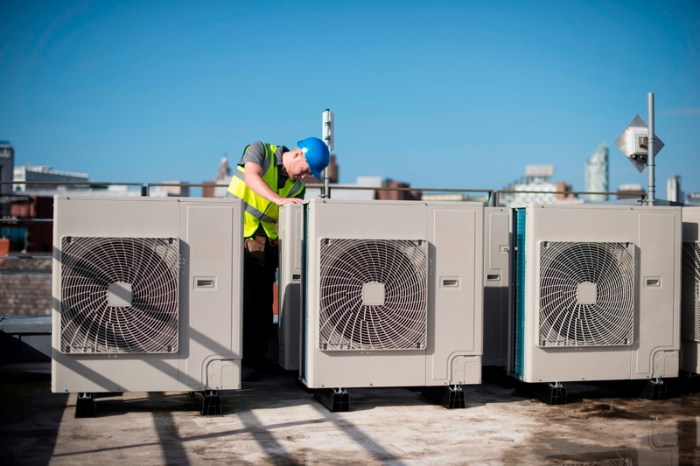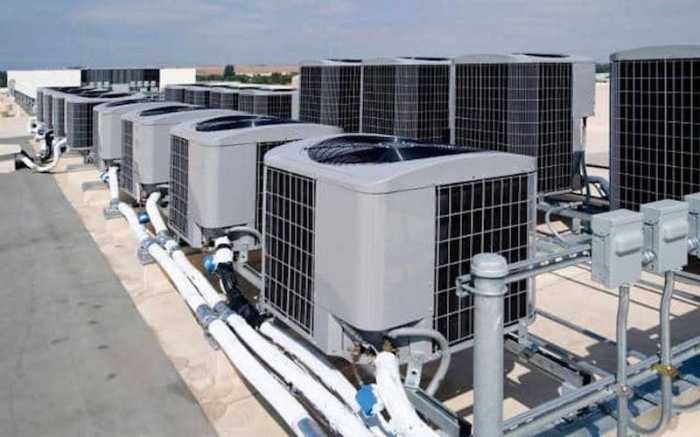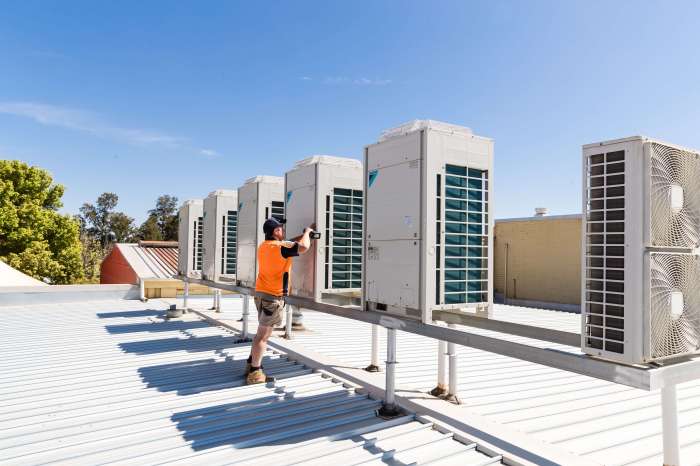Air conditioner maintenance for commercial buildings is essential to ensure optimal performance and efficiency of HVAC systems in business settings. This article delves into the importance of regular maintenance, key components that need attention, best practices, and troubleshooting common issues, providing a comprehensive guide for businesses looking to maximize the lifespan of their air conditioning units.
Importance of Air Conditioner Maintenance for Commercial Buildings
Regular maintenance of air conditioners in commercial buildings is crucial for ensuring optimal performance and longevity of the system. Neglecting maintenance can lead to a variety of issues that can impact the comfort of occupants and the overall operation of the business.
Preventing Breakdowns and Costly Repairs
Proper maintenance helps identify and address potential issues before they escalate into major problems, preventing unexpected breakdowns that can disrupt business operations. By scheduling regular maintenance tasks such as cleaning filters, checking refrigerant levels, and inspecting components, businesses can avoid costly repairs and downtime.
Improving Energy Efficiency
Well-maintained air conditioners operate more efficiently, consuming less energy to cool the building. This not only helps reduce utility costs but also minimizes the environmental impact of excessive energy consumption. Businesses can benefit from lower energy bills and a greener footprint by investing in regular maintenance.
Enhancing Indoor Air Quality
Proper maintenance of air conditioners involves cleaning and replacing filters, which helps improve indoor air quality by reducing dust, allergens, and pollutants circulating in the building. This can lead to a healthier and more productive work environment for employees and visitors.
Prolonging the Lifespan of the System
Regular maintenance can extend the lifespan of air conditioning systems, ensuring that businesses get the most out of their investment. By addressing minor issues promptly and conducting routine inspections, companies can avoid premature system failure and the need for costly replacements.
Complying with Warranty Requirements
Many air conditioner manufacturers require regular maintenance as part of their warranty terms. Failing to adhere to these maintenance guidelines can void the warranty, leaving businesses responsible for any repairs or replacements out of pocket. By staying up to date with maintenance tasks, businesses can ensure that their warranties remain valid.
Key Components of Air Conditioner Maintenance: Air Conditioner Maintenance For Commercial Buildings

Regular maintenance of commercial air conditioning systems is crucial to ensure optimal performance and efficiency. There are several key components that require attention to keep the system running smoothly.
Cleaning Filters, Coils, and Ducts
Regular cleaning of filters, coils, and ducts is essential for maintaining optimal air quality and efficiency in commercial air conditioning systems.
- Filters: Clean filters help to trap dust, dirt, and other particles, preventing them from circulating in the air and improving indoor air quality. Clogged filters can restrict airflow, reducing the system’s efficiency and increasing energy consumption.
- Coils: Dirty coils can hinder the heat transfer process, leading to reduced cooling capacity and increased energy consumption. Regular cleaning of coils helps to maintain proper heat exchange and improve system efficiency.
- Ducts: Clean ducts are essential for proper airflow and distribution of conditioned air throughout the building. Dust and debris buildup in ducts can restrict airflow, impacting system performance and indoor air quality.
Inspecting and Maintaining Refrigerant Levels
Monitoring and maintaining proper refrigerant levels is crucial for the efficient operation of commercial air conditioning systems.
- Refrigerant: Insufficient or excessive refrigerant levels can affect the system’s ability to cool effectively and can lead to increased energy consumption. Regular inspections and maintenance of refrigerant levels help to ensure optimal system performance.
- Leaks: Detecting and repairing refrigerant leaks is important for maintaining system efficiency and preventing potential environmental harm. Leaks can lead to refrigerant loss, reduced cooling capacity, and increased energy consumption.
Best Practices for Air Conditioner Maintenance

Regular maintenance of air conditioners in commercial buildings is crucial to ensure optimal performance and longevity of the HVAC system. Here are some best practices for air conditioner maintenance:
Routine Maintenance Checks
- Inspect and clean the air filters regularly to ensure proper airflow and efficiency.
- Check the thermostat settings to make sure they are calibrated correctly for comfort and energy savings.
- Inspect and clean the evaporator and condenser coils to improve cooling efficiency.
- Examine the refrigerant levels and top up if necessary to prevent system breakdowns.
Maintenance Schedules
- Monthly Inspections: Conduct visual checks and clean filters.
- Quarterly Inspections: Check coils, refrigerant levels, and thermostat settings.
- Bi-Annual Inspections: Perform thorough cleaning, lubrication of moving parts, and system testing.
Maintenance Checklist for Technicians, Air conditioner maintenance for commercial buildings
| Task | Frequency |
|---|---|
| Inspect air filters | Monthly |
| Clean evaporator and condenser coils | Quarterly |
| Check refrigerant levels | Bi-Annually |
| Calibrate thermostat settings | Quarterly |
| Lubricate moving parts | Bi-Annually |
Troubleshooting Common Issues in Commercial Air Conditioners
When it comes to the operation of commercial air conditioners, encountering issues is not uncommon. Proper troubleshooting techniques are essential to identify and address these problems effectively. Regular inspections and preventive maintenance play a crucial role in ensuring the smooth functioning of these systems.
Low Airflow Issues
Low airflow in commercial air conditioners can lead to inefficient cooling and discomfort for occupants. Common causes of low airflow include clogged filters, blocked ducts, or issues with the fan motor. To troubleshoot this problem, start by checking and replacing air filters, ensuring that vents and ducts are clear of obstructions, and inspecting the fan motor for any faults.
Inconsistent Temperature Control
Inconsistent temperature control can be a frustrating issue for commercial buildings, leading to varying comfort levels for occupants. This problem can be caused by thermostat malfunctions, refrigerant leaks, or issues with the compressor. To diagnose this issue, check the thermostat settings, inspect for refrigerant leaks, and ensure that the compressor is functioning correctly.
Unusual Noises
Unusual noises coming from commercial air conditioners can indicate underlying issues that require attention. These noises can be caused by loose or damaged components, worn-out belts, or issues with the motor. When troubleshooting unusual noises, inspect the system for loose parts, tighten or replace belts as needed, and check the motor for any signs of damage.
Importance of Regular Inspections and Preventive Maintenance
Regular inspections and preventive maintenance are critical in addressing potential problems in commercial air conditioners before they escalate. By scheduling routine maintenance checks, HVAC technicians can identify and resolve issues early, ensuring optimal performance and extending the lifespan of the systems. This proactive approach helps prevent costly repairs and downtime, ultimately saving time and money for building owners.
Final Wrap-Up

In conclusion, maintaining air conditioners in commercial buildings is not just about comfort but also about cost savings and energy efficiency. By following the best practices Artikeld in this guide, businesses can ensure their HVAC systems operate smoothly and effectively, creating a conducive environment for employees and customers alike.
When it comes to maintaining your air conditioning unit, it is crucial to know how to clean air conditioner vents properly. By following the right steps, such as using a vacuum cleaner or a soft brush, you can ensure that your vents are free from dust and debris, allowing your unit to function efficiently.
For more detailed instructions, you can refer to this guide on how to clean air conditioner vents properly.
To keep your air conditioner running smoothly, it is essential to learn how to clean air conditioner coils regularly. By using a coil cleaner and gentle brushing techniques, you can prevent dirt buildup and maintain optimal cooling performance. For a step-by-step guide on cleaning your air conditioner coils, check out this article on how to clean air conditioner coils.
For the best air conditioner maintenance tips, it is important to follow a routine schedule and perform regular inspections. From changing filters to checking refrigerant levels, these maintenance practices can help extend the lifespan of your unit and improve its overall efficiency.
To discover more useful tips, you can explore this article on best air conditioner maintenance tips.